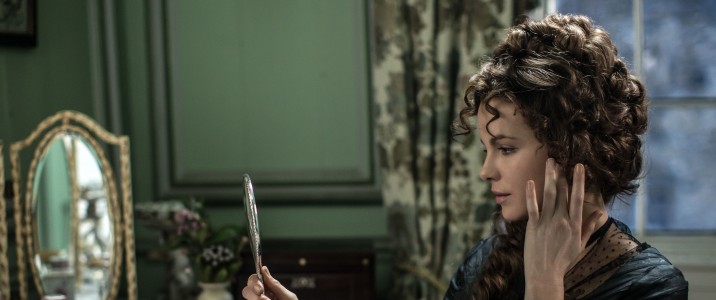If most of Jane Austen’s bibliography can be summarily described as gently satirical jabs towards the landed gentry of the late 18th century, then Whit Stillman’s Love & Friendship is the most acerbic interpretation of that quality. Based on her little-known novella Lady Susan, the film will prove familiar to fans of both the author and the filmmaker, the previous output of the latter in particular delving into the world of chic affluence with a trademark sense of dry irony and reserved affection. But this, his first adaptation, proves that Whitman is a natural fit for Austen’s literary sensibilities as much as she is for his cinematic flourishes. In conjunction, their distinct authorial voices provide a portrait of a secluded social construct that is both fond of said society’s airs of civility and critical of its hypocritical pretense of eliding human nature, or at the very least diluting it.
The aristocratic figurehead of this parable, Lady Susan Vernon, is certainly one of Austen’s most wicked creations, and in Kate Beckinsale finds herself a perfect cinematic avatar. Beckinsale, whose career began with Kenneth Branagh’s Much Ado About Nothing, has certainly found her talent squandered in questionable projects over the last quarter century. Yet reuniting with Stillman nearly two decades after The Last Days of Disco has provided Beckinsale with a role that has given her the chance to utilize her sophisticated sensuality to add dimension to her character rather than detract from it. Lady Susan is indeed a cunning socialite whose eloquence and elegance earn her the adoration of men both married and single. When a gentleman recognizes her on the street, she promptly shoos him away. Her companion, Alicia Johnson (Chloë Sevigny), is outraged at the man’s presumed temerity, yet Susan confides that she “would never speak that way to a stranger.” Her calculated navigation of social morays without missing a beat earns as much begrudging admiration as it does moral indignation.
As Susan worms her way into the good graces of a potential suitor several years her junior (Xander Samuel), she endeavors to arrange a marriage between her daughter and a nobleman for whom “blockhead” seems an insufficient description, though it is certainly used several times. If there is a nadir to this vision of British aristocracy, it is embodied wholesale by Sir James Martin, a giddy buffoon who initially believes there are twelve commandments. When he is corrected that there are only ten, he sets it upon himself to decide which two commandments should be excised. Played with guileless abandon by Tom Bennett, he provides a delightful foil to Susan’s introverted daughter who finds the idea of marrying such a man revolting. Unfortunately, her concerns are quelled by her tyrannical mother’s self-absorption, and she serves as the closest to a moral compass the film has.
Watching this film, I was reminded of Whitman’s directorial debut Metropolitan in which a group of adolescents that refer to themselves as urban haute bourgeoisie (or UHB, for short) dominate their social interactions with coldly intellectual discourse at the expense of common sense. Indeed, when the resolution of Love & Friendship comes to a head, it almost seems like a foregone conclusion that this should be where Austen’s characters end up. But therein lies the trademark irony for which Stillman has built his entire career upon. He thrives upon characters who are articulate, inquisitive, yet to a point where they miss the forest for the trees, almost literally here as they converse in opulent gardens and corridors that always seem too narrow for comfort. “We do not live, we visit,” Susan quips, and such an attitude seems to spur from an ideology that equates companionship to labor at a transition into Industrial Capitalism. After all, it is no mistake there is an ampersand in the title rather than its informal variant.
What Austen understood and what Stillman, with his band of crafted collaborators, strives to express is the folly of human endeavors within the constraints of their own societal creations. Grace, wit, and intelligence are virtues that should be cultivated without ignoring our own shortcomings as a species nor remain ignorant of the confined spaces that can exacerbate our primal urge for self-preservation. Both artists know perfectly well that this would all be terribly distressful if it weren’t all so damnably funny.
